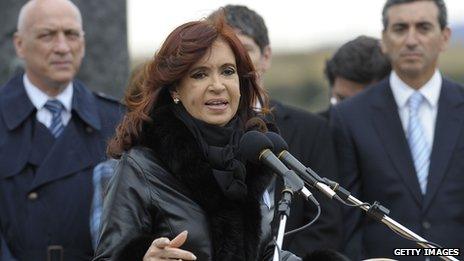Q&A: Argentina's diplomatic offensive on Falklands
- Published

President Cristina Fernandez says UK control over the islands is unjust
Argentine President Cristina Fernandez de Kirchner is set to address the annual meeting of the UN decolonisation committee to present her country's claim of sovereignty over the British-governed Falkland Islands, which Argentina calls the Malvinas.
"We are not asking for anything more than a dialogue," President Fernandez has said, citing UN resolutions which urge negotiations between London and Buenos Aires.
The United Kingdom refuses any such talks.
What is the UN Special Committee on Decolonisation?
The body monitors implementation of the UN General Assembly Resolution 1514, which in 1960 granted independence to colonial countries.
The decolonisation process most recently saw the return of British-ruled Hong Kong and Portuguese Macau to China in 1990s and East Timor's independence from Indonesia in 2002.
But the job is unfinished as 16 "non-self-governing territories" still exist.
How much leverage does the Committee have?
Some see the Committee as an unimportant anachronism. The US, with three territories on the list, and Britain, with 10, do not participate.
Annual meetings tend to end with a collective resolution acknowledging that cases have been heard. On the Falklands, the committee regularly urges Britain and Argentina to negotiate a solution.
What about UN resolutions on the Falklands?
The islands' sovereignty has been on the UN agenda since 1965, when Resolution 2065 acknowledged that they were a remnant from colonial days. This and subsequent resolutions called on the UK and Argentina to negotiate a solution.
However, the resolutions have proved ineffective without the approval of the UN Security Council, where the UK has a veto.
During the 1982 war, the Security Council passed two resolutions urging a diplomatic solution.
Have there been any negotiations?
Talks between the UK and Argentina started in 1965.
According to Argentina's recently de-classified Rattenbach Report, the countries reached a key point in 1968, when they drafted a "secret" memorandum of understanding, stating that "the government of the United Kingdom will recognise the sovereignty of the Republic of Argentina over the islands". The date for this was to be agreed later.
However, negotiations collapsed, with the two sides unable to overcome their differences.
How do the current governments tackle the dispute?
Malvinas is a key foreign policy issue for Argentina. Last summer, British Prime Minister David Cameron said that the Falklands' sovereignty was non-negotiable. Ms Fernandez called his comments "mediocre" and "almost stupid".
She has repeatedly challenged Mr Cameron, leaving little room for dialogue. In conducting military exercises in the South Atlantic, London has also limited the potential for discussion.
What does the international community think?
Opinion is mainly sympathetic to Buenos Aires, backing calls for negotiations, although not necessarily endorsing its claim over the islands.
Last December, regional trading bloc Mercosur, which groups Argentina, Brazil, Uruguay and Paraguay, showed its support by closing ports to ships flying the Falklands flag.
China ratified its backing for Argentina's sovereignty claim last December, reciprocating Buenos Aires' support of Beijing's claim to Taiwan as a province.
The European Union and the US say they recognize the "de facto UK administration of the Falklands/Malvinas", but take no position regarding the issue of sovereignty, which they say must be settled by the UK and Argentina.
Russia limits its position to urging inter-governmental dialogue. However, some Russian commentators have suggested that Moscow should choose a side.
"Latin America is a very important region for our country in economic, political and strategic (in the event of a sharp deterioration in Russian-American relations) terms," the country's international radio, The Voice of Russia, said in February.
<link> <caption>BBC Monitoring</caption> <url href="http://www.monitor.bbc.co.uk/" platform="highweb"/> </link> <italic> selects and translates news from radio, television, press, news agencies and the internet from 150 countries in more than 70 languages. It is based in Caversham, UK, and has several bureaux abroad. For more reports from BBC Monitoring, </italic> <link> <caption>click here</caption> <url href="http://www.bbc.co.uk/news/world-18190302" platform="highweb"/> </link>
- Published12 June 2012
- Published11 June 2012
- Published8 June 2012
- Published2 April 2012